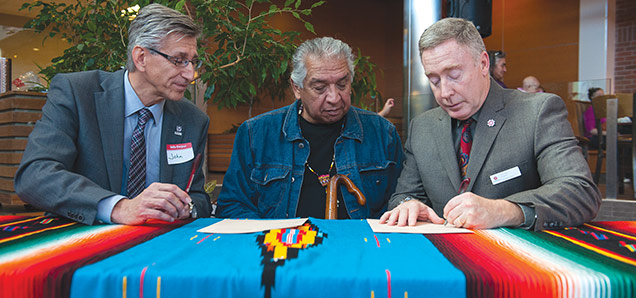Agreement signed for First Nations Studies to continue at Western
 CREDIT: JOHN SING
CREDIT: JOHN SINGFrom left to right: John Doersken, Bruce Elijah and college President Peter Devlin sign an agreement, which allows Fanshawe students in the First Nations Studies program to transfer five credits towards a degree at Western.
Fanshawe College’s First Nations Studies and Western University’s First Nations Studies programs have signed an articulation agreement on October 23, allowing Fanshawe students to transfer credits towards the degree at Western.
Students in Fanshawe’s program who continue their studies at Western can now transfer the credits of two core classes and three elective classes toward the First Nations Studies degree. One of those classes that is being taught at the college is Western’s Introduction to First Nations Studies, in which students examine key issues concerning Indigenous people from an academic and community perspective.
“What the articulation agreement between Western and Fanshawe does is it creates opportunities for students if they wish to continue on to pursue their university degree if they have the intent of going on to graduate studies or other careers that a degree in First Nations Studies can help facilitate,” said Rick Fehr, who is the acting director of the First Nations Studies program at Western.
“I think it’s a great idea to have more options for students in the First Nations Studies program at Fanshawe, and it goes a long way to fostering a sense of community and relationship between Western and Fanshawe.”
Fanshawe’s First Nations Studies program is offered through the School of Language and Liberal Studies and is based on the local three Indigenous communities: Muncey Deleware Nation, Oneida Settlement and Chippewa of the Thames. They represent Lenape, Haudensone and Anishinabe nations, respectively.
Students learn about the cultures’ traditional practices, history and contemporary issues concerning Indigenous communities.
“I was really excited to see the vice-provost, Dr. Doerksen, and our president, Peter Devlin, there on hand with our elder, who represents are local Indigenous people, Bruce Elijah, [Wolf Clan from the Oneida Nation],” said Jessica Ford, an instructor in the First Nations Studies program.
“I’m excited to see all three of them sit down and work on a contemporary treaty acknowledging the relationship between post-secondary education and First Nations people.”













